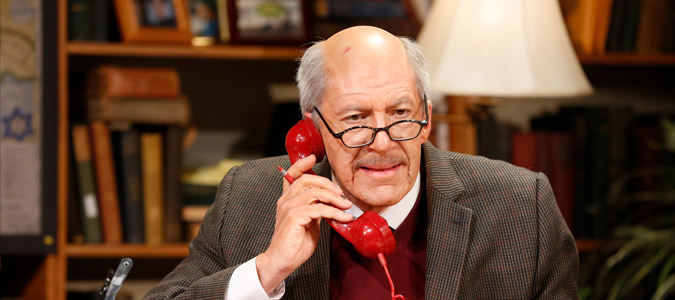

Wiesenthal
Opening Night: November 5, 2014
Closing: February 22, 2015
Theater: Acorn Theatre
Filled with hope, humanity and humor, Wiesenthal is the riveting true story of Simon Wiesenthal, an ordinary man who did extraordinary things. Nicknamed the “Jewish James Bond,” he devoted his life to bringing more than 1,100 Nazi war criminals to justice. Intelligent, funny, flawed and noble, Wiesenthal was a universal hero. His unbelievable dedication and tenacity over decades is honored in this play, which gives equal weight to his wisdom and wit during his long, purposeful life.
BUY TICKETSREAD THE REVIEWS:
November 6, 2014
Known as the “Jewish James Bond,” Simon Wiesenthal is credited with bringing 1,100 Nazis war criminals to justice, including a role in the capture of Adolph Eichmann, the architect of The Final Solution. The survivor of numerous concentration camps was adamant in his commitment to speak for the 6 million dead Jews. He refused to quit — even when he and his family were threatened. As portrayed by Tom Dugan, the writer and star of the riveting one-man show Wiesenthal, off-Broadway at the Acorn Theater, Weisenthal did not fight for vengeance but justice. In addition to Jewish Holocaust victims, he also spoke for the murdered Soviets, Poles, Gypsies, homosexuals and Jehovah’s Witnesses. The former architect was relentless in his refusal to be sidelined by bureaucratic indifference, the Cold War and ongoing anti-Semitism. His life’s work was a promise to the 6 million: “I did not forget you.”
READ THE REVIEWNovember 5, 2014
Today, famed Nazi hunter Simon Wiesenthal retires from his noble line of work, and we are the final group of visitors he will entertain at his Austrian headquarters. Such is the pretense of Tom Dugan’s self-penned solo show Wiesenthal, in which he heartily embodies this intriguing historical figure. The premise may be a bit contrived, but when a 90-minute discourse from the man himself is what you’re after, there are few alternative routes to this road. Fortunately, the journey itself ends up both thoroughly edifying and surprisingly uplifting. “Uplifting” might not be the first-choice adjective Wiesenthal would attribute to his 60-year career as a private agent devoted to bringing Nazi war criminals to justice. As a survivor of several Jewish concentration camps, he briefs us on his torturous journey through World War II, describing many of the indignities he suffered along the way. Yet he asserts early on: “It is not my goal today to produce tears. If that is what you want, you should go home and watch soap operas.”
READ THE REVIEWNovember 5, 2014
For a man who devoted his life to hunting down Nazi war criminals, Simon Wiesenthal was quite the cutup. That’s but one of the revelations of the fine one-man show Wiesenthal. Written by and starring Tom Dugan — who, in a program note, poses the question, “Why would an Irish Catholic kid from New Jersey write a play about Simon Wiesenthal in Vienna?” — it succeeds with skill and unexpected humor in bringing its heroic figure to life. Set on the day the 95-year-old retired, in 2003, Wiesenthal relates his story to the young students visiting his office at Vienna’s Jewish Documentation Center. Beowulf Boritt’s set gives us a faithful replication of it, right down to its rows of bookshelves, battered filing cabinets, worn wooden desk and photo of Anne Frank.
READ THE REVIEWNovember 5, 2014
There’s a large map on the set of Wiesenthal, and hundreds of books line the onstage shelves. The script, too, is filled with information: dates, names, statistics. But it’s the personal moments that at times elevate this otherwise standard one-man show about the life of Simon Wiesenthal. Born in 1908 in what is now Ukraine, Wiesenthal was transferred among several Nazi concentration camps during World War II. He survived the Holocaust and dedicated his life to memorializing the millions who were killed in the camps, and to hunting down their murderers. The play, set in 2003, two years before his death, relates the details of a few of his investigations. Among them were the pursuit of Franz Stangl, the former commandant of the Treblinka death camp, and the search for the officer who arrested Anne Frank. Wiesenthal’s persistence and hard-won humor are well conveyed throughout the 90-minute running time. Yet much of what is told here can be gleaned from the countless stories written by or about him. The script, by Tom Dugan, who also stars, is straightforward and frequently static. Tales that might lend themselves to theatrical tension are often merely recounted. Controversy, too, is avoided; as Dwight Garner, a critic for The New York Times, once wrote in a review of a Wiesenthal biography, he “was a complicated hero, an angel with dirty wings.” Such complexity is rarely approached.
READ THE REVIEW





















